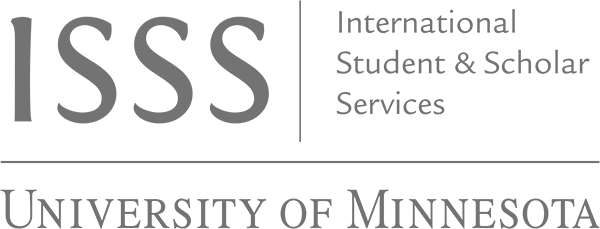Pre-Arrival
What is a J-1 scholar, a DS-2019, and SEVIS?
Visit the Terms to Know for the explanations to these and other important and commonly used terms.
When should a department submit the initial Request for a DS-2019 Application?
Between two and four months before the expected start date
What is the processing time for an initial DS-2019?
Four weeks.
What is the processing time for transferring a scholar to the UMN from another institution?
Transfer applications should be submitted to ISSS at least 3 weeks prior to the scholar's UMN start date.
Transfer processing timelines can vary between institutions. Please contact [email protected] if you have questions about the transfer process.
What should the start date for the scholar be?
The start date that will be written in the Initial Request for DS-2019 application will be the start date on the DS-2019 that ISSS will process through the SEVIS system. The start date and end date must match the start and end dates stated in the department’s invitation/offer letter to the scholar being invited.
May a scholar arrive to the U.S. before the start date on their DS-2019?
Yes, up to 30 days before the start date on their DS-2019.
May a scholar arrive to the U.S. after the start date on their DS-2019?
Yes, but no later than 25 days after the start date on their DS-2019. The scholar must also have completed their ISSS Scholar Check-In within 25 days after the start date. This is because ISSS is required to report the scholar’s arrival in the SEVIS government database within 30 days of the scholar’s start date.
Occasionally, scholars experience delays in their arrival plans. What if a scholar won’t be able to arrive and check-in at ISSS within 25 days of the start date?
- To request new program dates, please complete the J-1 Amendment Request on MyISSS.
- Be prepared to provide a new start date (and new end date, if needed). If a record is not amended as needed, serious consequences could result for the scholar and their SEVIS record.
- Please also inform ISSS if a scholar has been denied a visa or wishes to cancel their program.
A) A scholar wishes to use their own health insurance, or B) A scholar’s funding source offers a non-UMN health insurance plan. May the scholar use this insurance during their stay at the UMN?
- International scholars visiting the UMN for more than 31 days are required to enroll in the University-sponsored Student Health Benefit Plan for International Scholars unless they are already enrolled in a U.S.-based employer-sponsored group health plan or the University-sponsored Graduate Assistant Health Plan. For more information about this policy, and for information on how to obtain a waiver, please contact the Office of Student Health Benefits.
- Scholars visiting the University for 31 days or less may choose to purchase the Student Health Benefit Plan, but are not required to do so. Scholars choosing not to enroll in the University-sponsored Student Health Benefit Plan are required to carry their own health insurance plan for the duration of their visit to the University. A scholar's health insurance plan must meet J-1 U.S. Federal regulation requirements (“Insurance”).
What happens if scholars do not have UMN health insurance, such as the University Employee Benefits Health Insurance or the UMN Student Health Benefit Plan (SHBP)?
They forfeit valuable ISSS services.
What happens if scholars have neither UMN health insurance nor other insurance that meets the federal requirements?
This is reason to terminate a scholar’s J-1 program and they will need to depart the U.S. immediately.
The scholar is inquiring about a DS-7002 Form. Do they need this for their J-1 visa?
No, they do not need this and the UMN J program does not issue these documents. This form is only for J-1 Interns and J-1 Trainees. UMN J-1 scholars will only be one of the following: Research Scholar, Professor, or Short Term Scholar.
(Note: MAST J-1 Trainees are not under the jurisdiction of ISSS. Please contact CFANS for more information about MAST).
Post-Arrival
The scholar plans to travel out of the U.S. for a conference/to visit home/etc. Is there anything they need to do beforehand?
Yes. Please have them review the J-1 and J-2 travel guidelines on the ISSS website and complete the necessary tasks applicable to them (for example, obtain a valid travel signature).
What is the processing time for an extension of a DS-2019 for a current scholar?
Once the Extension Request application is submitted, processing time is approximately one to two weeks. Remind scholars that they must extend their UMN health insurance coverage as well. If employed, scholars must present their newly extended DS-2019 to Payroll.
What is the fee for a J-1 program extension?
$485. This is the ISSS administrative fee. This fee is the same for all extensions regardless of length and cannot be adjusted.
The department would like to begin paying the J-1 scholar. Is this possible and what needs to be done?
Yes, this is possible. If the funding will be ongoing or if the amount given to the scholar will be more than 25% of their minimum living expense requirements ($1300/month), then the scholar should request an updated DS-2019 to reflect the new/additional funding. To do this, they must submit to an ISSS advisor a letter from the department explaining the amount and reason for the funding and the J-1 Scholar DS-2019 Request Form.
If the amount of funding will be less than 25% of the scholar’s minimum living expense requirements, only a letter from the department explaining the amount and reason for the funding will suffice. Please send a copy of this signed letter to Julie Halfen.
A scholar has been invited to present at a non-UMN institution/company that will also compensate the scholar. Is this permissible according to J-1 regulations?
The scholar is allowed such activity, with prior ISSS authorization for occasional lectures and short-term consultations.
